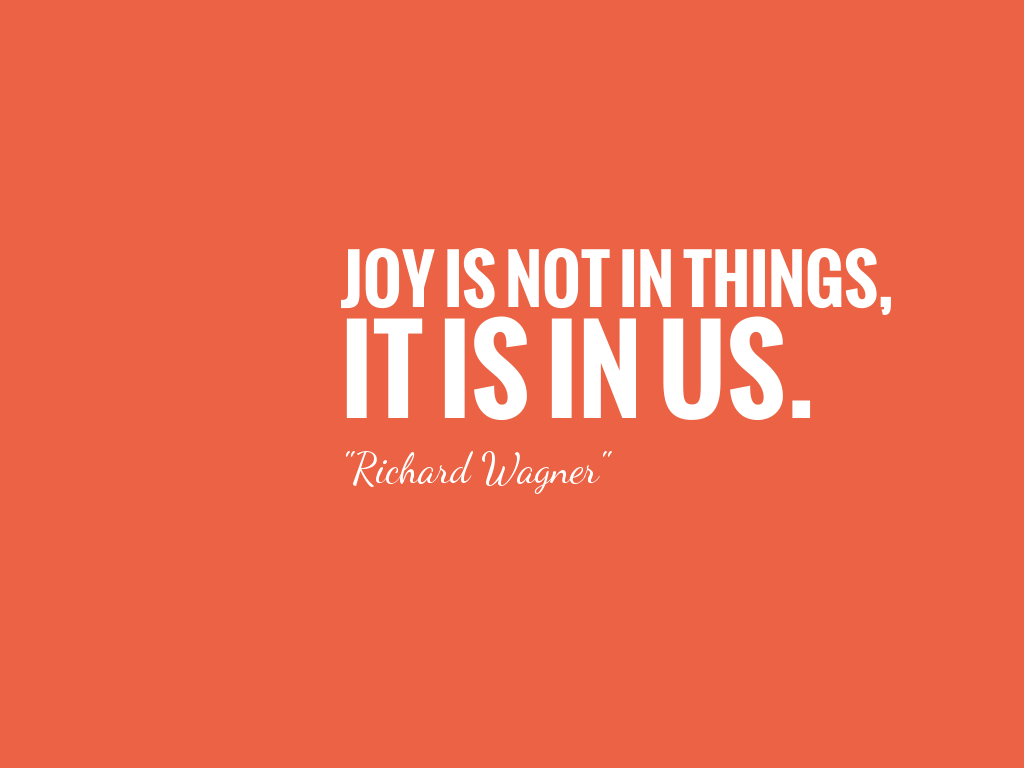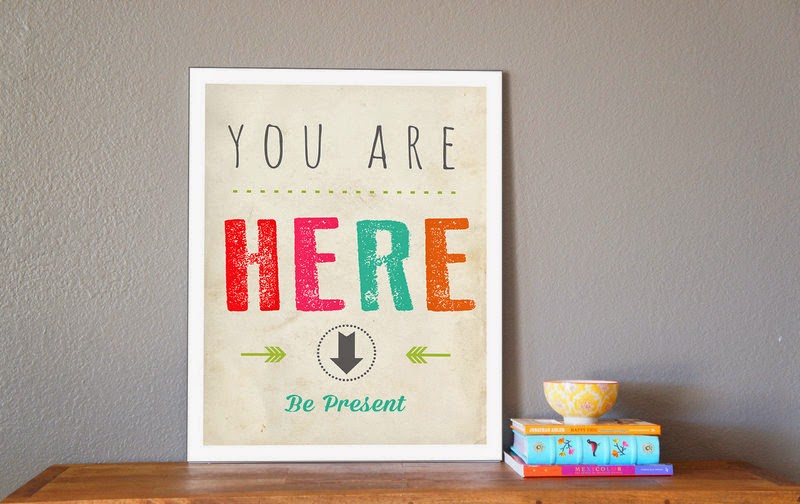
by Jonathan Manafo | May 28, 2014 | Sunday Conversations
It seems to me that we’re always settling for second best in our lives. We settle for friends who aren’t the best, we settle for a job that does not really fulfill us, we settle for entertainment that gives us a quick fix with no long lasting enjoyment. Maybe it’s because we’re conditioned to be consumers of stuff and not explorers of truth. That’s a heavy way to start a post, I know, but perhaps you’re identifying with this right from the start.
John Mayer wrote a song for his ‘Heavier Things’ album called ‘Something’s Missing’. He writes about things that have given him ‘some’ satisfaction, but in the end, after the things on his list are checked off, something is still missing. I think it’s JOY. One line in the second verse is telling. “I’m dizzy from the shopping mall, I searched for joy, but bought it all.”
You think in our search for happiness we missed the point? Maybe happiness is not what it’s cracked up to be – it is a temporary feeling based on emotions that are connected to circumstances or commodities. Tolstoy said that “Joy can only be real if people look upon their life as service and have a definite object in life outside themselves and their personal happiness.”
When you think about it, Jesus never offers us happiness, but he does offer us something better. That ‘better thing’ would be JOY!
From Israel’s years in Exile to Jesus’ parables about the Kingdom, God has been hinting at a JOY that is beyond compare. While Israel is stuck, literally in another land, words of hope through Isaiah were pointing a new experience of Joy that was just around the corner. What they didn’t know is that Jesus was waiting for them around that corner. In Matthew 13:44, one of Jesus’ parables on the Kingdom is about a man that experiences ecstatic JOY. Paul, in Romans describes the Kingdom of God as righteousness, peace and…you got it, JOY.
Jesus, in John 15 says that he came so that his JOY (God’s JOY) would be in us, and that the sparks of JOY we already sensed in us would be complete in and through him. Again, Paul, this time in Galations, describing what our lives would look like with the spirit of Jesus in us, says that JOY is a fruit or evidence of Jesus in us.
This why both James & Peter say that we can experience JOY when times are tough. How else could we consider trials a JOY. If JOY is in us, then no matter the circumstance it’s there – it’s ours. If we only shoot for ‘HAPPY’ then even though we’ll feel good for a bit, that feeling can be gone pretty quickly, but if we take Jesus offer of JOY we are going for the best, not the feeble competition.

This is our last post in our ‘So you Wanna be Happy?’ series. So lets ask and answer this one more time.
You wanna be Happy? Everything we’ve answered so far still goes – Forgive, Be Generous, Be Present, Be Thankful. But most importantly, let Jesus fill you with (his) JOY!
“JOY is not in things, it’s in us.” And it can only be in us because Jesus so graciously puts it there.

by Jonathan Manafo | May 26, 2014 | Sunday Conversations
We get it. If you’re happy you probably have something to be thankful for. But what about the days you’re not happy, can you be thankful on those days?
What comes first, being happy or being thankful? Great question. Happiness should lead you to say thank you, however, thankfulness will enable you to be happy.
Think about what these people have said:
“Thankfulness is the enemy of discontent and dissatisfaction.” (Harry Ironside)
“Joy is thankfulness, and when we are joyful, that is the best expression of thanks we can offer the one who delivers us from sorrow and sin.” (Thaddeus of Vitovnica, a Serbian Monk)
“Thankfulness creates gratitude which generates contentment that causes peace.” (Todd Stocker)
Paul, in Colossians, puts it simply, “Be Thankful”.
There are many places in your life to show gratitude. I think we can safely say that People & Circumstances are at the top of the list.
PEOPLE
At the beginning of each of Paul’s new Testament letters (except for Galations) we see a common theme: He’s always saying thank you! We read things like this:
– I’m always praying & being thankful for you…
– When I remember you I say thank you…
– I can’t stop thanking God for you…
– I name you before God when I pray…and I thank him for you…
Paul wasn’t known to really be a people person. So when you read this in each of his letters, you can assume two things: one, is that he was truly grateful for the people God had placed in his life, and two, he knew that being grateful encouraged those he was writing to.
Who are the people in your life you need to be (more) thankful for? Will you take the time to let them know?
CIRCUMSTANCES
Saying thank you is easiest when times are good. Even though we probably aren’t as grateful as we should be, it comes to us easier when nothing is going wrong and everything is going right.
In his book, The Year of Living Biblically, A.J. Jacobs expressed his new found awareness for being grateful for the simplest things.
“I can’t
stop. Just now, I press the elevator button and am thankful that it arrives
quickly. I get onto the elevator and am thankful that the elevator cable didn’t
snap and plummet me to the basement. I go to the fifth floor and am thankful
that I didn’t have to stop on the second or third or fourth floor. I get out
and am thankful that Julie left the door unlocked so I don’t have to rummage
for my King Kong key ring. I walk in, and am thankful that Jasper is home and
healthy and stuffing his face with pineapple wedges. And on and on. I’m actually
muttering to myself, ‘Thank you. . .thank you. . . thank you.’ It’s an odd way
to live. But also kind of great and powerful. I’ve never before been so aware
of the thousands of little good things, the thousands of things that go right
every day.”
How about saying thank you when things…aren’t so good? In Paul’s letter to the Philippians, he writes this, ‘not to be
anxious about anything, but in every situation, with thanksgiving, pray…I have
learned to be content whatever the circumstances.”
How can we be content in ‘whatever’ circumstance? That’s really hard. You’re probably saying right now, ‘don’t you know what I’ve been going through? I can’t imagine being thankful or content for that.’ However, you probably have a friend who has gone through some tough times and has been able to say thank you for the mess. I have. They’ve said things like, ‘I’m thankful for cancer. I’m thankful for that mess in my life. Etc.’ This is probably why Alexandra Elle can say, “I am thankful for my struggle because without it, I wouldn’t have stumbled upon my strength.” Here’s Paul again, this time in 1 Thessalonians, being thankful for all things. “Rejoice always, pray
continually, give thanks in all
circumstances; for this is God’s will for you in Christ Jesus.”
Take a minute…even 5…what circumstance do you need to be thankful for? Is it a good one or a bad one? No one said it was going to be easy, but it will make you happy!
– – – – – – – – – – – – – – – – – – – – – – – – – – – – – – – – – – – – – – – – – – – – – – – – – – – – – – – – – – – – – – – – –
small group questions:
Do you think gratefulness is a DNA thing or a DISCIPLINE we can learn? (maybe both?)
Where does our culture sit on this issue? Very Grateful / Kind of Grateful / Not so Grateful / Could care a less ?
Seems like Paul is grateful for people in his life? He uses up some valuable writing space in each of his letters. Why? And do you think prayer have anything to do with his gratitude?
Take time in your group to share why you’re thankful for 2 people: one being a family member or friend and the other an individual in your life (past or present).
How about circumstances? Specifically the bad ones. Why do you think, as people who follow Jesus, it is possible to be thankful in ‘ALL’ circumstances?
Paul uses the word, ‘content’ when referring to our circumstances. How do we get to that point in our life?
Can you think of a ‘rough’ patch in your life where you can sincerely say, ‘God, thank you for that’?

by Jonathan Manafo | May 13, 2014 | Sunday Conversations
We’re beginning to figure out that happiness is going to cost us something. When we forgive it costs us our pride and when we give (being generous) it costs us our stuff. What if we said that in order to be happy, it’s going to cost you your attention.
When you look back to people in your life that brought you joy, they are the ones who paid attention to you, the ones who were and are PRESENT. Who is, or was that person for you? Your mom? Your dad? Your BFF? How about a teacher or a manager or a colleague? You know the people I’m talking about – the ones who are (truly) ‘with you’ when they’re with you.
Let’s face it, not everyone has this gift; the ability to be present in the moment, so the important conversations or opportunities don’t slip away. We don’t mean the opportunities to make you rich or drive your career, but the ones that build relationship with the people you care about the most.
Interruptions can be a hassle. Think about it, you’re on your merry way when someone ‘interrupts’ your plans. For those of us who are more task driven, this can really drive us crazy. But what if the people in our life were not viewed as interruptions, but opportunities to grow relationship and make each other better. Henri Nouwen (a famous professor turned spiritual director/servant) once saw students as interruptions, until he realized that more than research and academics, they were the purpose of his calling – they were his business.
Jesus was well documented as taking interruptions in stride. More than that, he welcomed the person in need who interrupted what he and his disciples had on the agenda that day. We learn from Jesus as much as anyone else, to welcome change in our schedule and see what God has in store for that ‘moment’. We can pick two spots in the gospel (out of many) that highlight this. In Mark 10:13-16, Jesus welcomes children to his side. When others thought they might be a nuisance, Jesus says, “Let the kids come to me. Don’t stop them. The kingdom of God belongs to people like them.” This is in a society where children were to be seen and not heard. In another instance (Luke 10:38-42), we find Martha & Mary entertaining Jesus in their home. The traditional take on this story is that Jesus honours Mary for being present with him, while Martha is cooking. There’s a little more to this story. In the 1st century, there were places for men and places for women. Men were found in the common rooms, the places where learning and conversation happened. Women were found behind the scenes (kitchens and working rooms). Never were the two spaces brought together. So when Mary chooses to be with Jesus, she’s crossing an invisible (social) barrier. She’s saying that she doesn’t care about what other’s think, she wants to be with and learn from Jesus. Even more significant is that Jesus welcomes this and doesn’t shun her away. He also breaks the barrier so that he can be present with her.
What’s the best way to be present with others? The art of Listening. James says (1:19) that we should ‘be slow to speak and quick to listen.’ If we just took this verse and others in the scripture more seriously, we’d be more present and seize the important moments in our lives. Listening is both a genetic skill and a learned skill. However we acquire this skill, we need to add it to who we are and how we interact with others. If we do, we’ll be able to ‘practice the presence of people’. We wanna be happy, but we often make the mistake of using selfish means to get us there. In this case, happiness/joy will cost us our attention. However, Being Present with people, (truly) being with them, will add value to their lives and bring us much joy in return.
Mitch Albom (in his book, Have a Little Faith) says this about his childhood Rabbi, “He had a way of looking at you in the eye and making you feel like the world had stopped and you were all that was in it.”
I want to be known for that. How about you?
(check below for some bonus footage)
– – – – – – – – – – – – – – – – – – – – – – – – – – – – – – – – – – – – – – – – – – – – – – – – – – – – – – – – – – – – – – – – –
small group questions:
Talk about someone in your life that really listened to you. Someone who you felt was present. How did that make you feel?
Jesus seemed to be in the ministry of interruptions. On numerous occasions he welcomed the person vying for his attention. These turned into powerful moments of healing, help, wholeness. What can we learn from Jesus in this? How hard is it for us to implement this in our lives?
When you read the Martha & Mary story, what do you get out of it? (Luke 10:38-42)
Read James 1:19. Nice to read, but hard to execute? What are some ways this can be true for you and the (important) relationships you’re in? Any initial steps you can take to be at James advice for us? (cf Proverbs 10:19, 17:28)
(bonus footage)
Tips to Listening:
– stay focused on what others are saying, not on what you want to say
– watch your body language
(conversations are 3 parts: 7% content, 38% tone of voice, 55% non-verbal communication)
– think about the differences between you and others (gender, generational, etc.)
– put down what you’re working on
– find something to value in the other person
A blog post about the ‘one word’ I wanted to focus on in 2014 (inspired by Thalita Murray’s blog)

by Jonathan Manafo | May 7, 2014 | Sunday Conversations
My mom lives in the middle of the city. The air quality isn’t so good (it’s not horrible, but it can’t be a good as the 200km north of her), the traffic is busy, the TTC is walking distance, and one of Toronto’s largest malls is a few blocks away. There are many positive things I can think about when it comes to living in the city. Having a backyard that grows just about anything isn’t one of them. My mom’s backyard lawn grows faster that than a 90 year old man’s nose hair. I feel like it needs to be cut twice a week to just keep up (her grass, not the the nose hair). My son recently asked why her grass is so thick and grows so fast, ‘does she do anything to it Dad?’, he said. Actually, she does nothing to it. The only explanation is this: my grandfather lived in the same house for many years, and for all of those years he tended a garden that was 3/4’s the size of the yard. Can you guess which part of the yard grows well? You got it. The part where he invested so many years of generous love and attention.

When asked what makes us happy, most people respond, not by saying what they give, but by what they get. Things that make us happy are often associated with gifts, free money, pleasant surprises – not with what we give. Well, unpopular as it seems, giving is one of the best ways find happiness. Yes, giving makes you more happy than getting. And more than that, giving actually has a funny way of reproducing itself, in your life, in the life of the recipient, and in ways even unknown to us.
The Scripture’s grand narrative is one that describes a God who is generous. A God who loves unconditionally, lavishly, and with out any caps or limits. God shows generosity like no other. He leads by example in this category and invites us to lead others the same way. Some said that ‘generosity is an offering, given freely and out of pure love. No strings attached, no expectations.’ It’s a trait that is desirable by most people, but one that comes with a cost. The cost is simple, giving something away. Your time, your money, your gifts, your clothes, your energy, and on and on it goes.
In 2 Corinthians 9:6-15, Paul provides a young church a sketch of what it means to be God’s people. People who follow Jesus are those who give generously, those who invest in others, who sow seeds and expect them to grow. Paul would say that those who sow will also reap. For him it’s common sense. Whatever you plant will eventually grow. The difference would be that those who plant seeds of generosity can expect more growth in return. This doesn’t mean that you will be rich or that if you give away $100, you’ll get $111 back. What the scriptures invite us to is a generosity that yields fruit in unimaginable places. Paul says, in connection to Jesus’ generosity towards us, that this gift is indescribable. (I think he’s talking about Jesus’ gift for us as well as our generosity towards others)
The Kingdom of God is an upside down kind of kingdom where the King dies for his people, not the other way around. This is why NT Wright says, “The kingdom that Jesus preached and lived was all about a glorious, uproarious, absurd generosity.” If you think about the best thing that you can do for the worst person, and go ahead and do it, that would be a reflection of Kingdom generosity.
So you’re probably thinking that this is just a little too ideal – too much pie in the sky for any of us. How can we ever reach this kind of living? You’re absolutely right. It is a lofty expectation, but one that’s founded on the same impossibility. How could God be so generous to us? How could Jesus live the way he lived? Crazy right. But here’s how it can work: because of his love towards us, because of his gifts to us, because of his sacrifice for us, and finally, because of his resurrection for and in us, we can be this generous. It’s a process, it’s a journey, it’s a path, and if we stay on it, we’ll experience the returns that Jesus and the scriptures talk about.
My grandfather’s generous planting, cultivating, and care for the earth in his backyard wasn’t in vain. He saw some immediate returns: salad, tomatoes, peppers, green beans, etc. We, years later are still seeing other benefits. When I think of him, I can’t help but think of someone who generously gave for his family and friends. I think the same about my Dad. He was the first person to drop his card or cash to pay for others. He didn’t have the most in the bank, but often he had the most in his heart. I want to be known for the same kinds of things: giving & generosity. You see, people will never know us for what we keep, but they will remember us for what we give away.
Oh, and we’ll be happy too!!!






